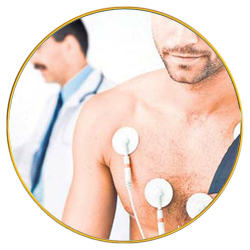It makes good sense to think that the profound state of rest gained when practising TM – deeper than sleep – will be good for your body. One of the commonest reported effects after learning is sleeping better and improved health. But don’t take our word for it: hundreds of doctors in the UK both practise TM and recommend it to their patients.
Scientific research shows that many illnesses tend to improve with regular practice of TM including insomnia, anxiety, high blood pressure, angina, hardening of the arteries, abuse of alcohol, cigarettes and non-prescription drugs, migraine, ulcers, asthma. Many of these are stress related.
But the benefits of TM for the body are not limited to the cure and prevention of particular medical conditions. By dissolving stress and tension TM enables you to unfold your full potential, enriching all aspects of your life.
To find out more please click one of the links below:
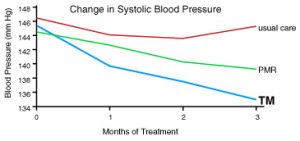 In a clinical experiment with elderly African Americans (mean age 66) dwelling in an inner-city community, Transcendental Meditation was compared with the most widely used method of producing physiological relaxation.
In a clinical experiment with elderly African Americans (mean age 66) dwelling in an inner-city community, Transcendental Meditation was compared with the most widely used method of producing physiological relaxation.
Subjects who had moderately elevated blood pressure levels were randomly assigned Transcendental Meditation, Progressive Muscle Relaxation (PMR), or usual care.
Over a 3-month interval, systolic and diastolic blood pressure dropped by 10.6 and 5.9 mm Hg, respectively, in the Transcendental Meditation group, and 4.0 and 2.1. mm Hg in the PMR group, with virtually no change in the usual care group.
A second random assignment study with the elderly conducted at Harvard found similar blood pressure changes produced by Transcendental Meditation over 3 months (11 mm Hg for systolic blood pressure).
*Reference I: In search of an optimal behavioral treatment for hypertension: A review and focus on Transcendental Meditation, chapter in Personality, Elevated Blood Pressure, and Essential Hypertension (Washington, D.C., Hemisphere Publishing, 1992). Reference II: Transcendental Meditation, mindfulness, and longevity: An experimental study with the elderly, Journal of Personality and Social Psychology 57(6): 950 964, 1989.
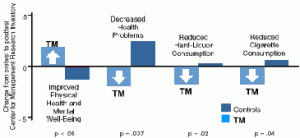 In two companies that introduced the Transcendental Meditation programme, managers and employees who regularly practised Transcendental Meditation improved significantly in overall physical health, mental well-being, and vitality when compared to control subjects with similar jobs in the same companies.
In two companies that introduced the Transcendental Meditation programme, managers and employees who regularly practised Transcendental Meditation improved significantly in overall physical health, mental well-being, and vitality when compared to control subjects with similar jobs in the same companies.
Transcendental Meditation practitioners also reported significant reductions in health problems such as headaches and backaches, improved quality of sleep, and a significant reduction in the use of hard liquor and cigarettes, compared to personnel in control groups.
*Reference: A prospective study of the effects of the Transcendental Meditation programme in two business settings, Anxiety, Stress and Coping: International Journal 6: 245262, 1993.
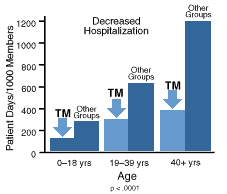
A study of health insurance statistics on over 2,000 people practicing the Transcendental Meditation programme over a 5-year period found that the Transcendental Meditation meditators consistently had less than half the hospitalization than did other groups with comparable age, gender, profession, and insurance terms.
The difference between the Transcendental Meditation and non-Transcendental Meditation groups increased in older-age brackets.
In addition, the Transcendental Meditation meditators had fewer incidents of illness in 17 medical treatment categories, including 87% less hospitalization for heart disease and 55% less for cancer.
Reference I: Medical care utilisation and the Transcendental Meditation programme, Psychosomatic Medicine 49: 493507, 1987. Reference II: Reduced health care utilisation in Transcendental Meditation practitioners, presented at the conference of the Society for Behavioral Medicine, Washington, D.C., March 22, 1987.
Reduced Need for Medical Care:Decreased Doctor Visits
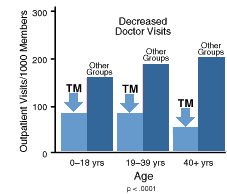
A study of health insurance statistics on over 2,000 people practicing the Transcendental Meditation programme over a 5-year period found that the Transcendental Meditation meditators consistently had less than half the hospitalization than did other groups with comparable age, gender, profession, and insurance terms.
The difference between the Transcendental Meditation and non-Transcendental Meditation groups increased in older-age brackets. In addition, the Transcendental Meditation meditators had fewer incidents of illness in 17 medical treatment categories, including 87% less hospitalization for heart disease and 55% less for cancer.
*Reference I: Medical care utilisation and the Transcendental Meditation programme, Psychosomatic Medicine 49: 493507, 1987. Reference II: Reduced health care utilisation in Transcendental Meditation practitioners, presented at the conference of the Society for Behavioral Medicine, Washington, D.C., March 22, 1987.
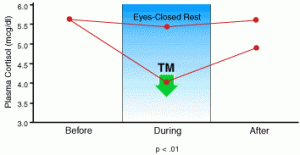 Increased levels of the hormone cortisol in the circulation are well established correlates of both acute and chronic stress.
Increased levels of the hormone cortisol in the circulation are well established correlates of both acute and chronic stress.
The study shows that plasma cortisol decreased during Transcendental Meditation, whereas it did not change significantly in control subjects during ordinary relaxation.
Sources: The transcendental meditation technique, adrenocortical activity, and implications for stress, Experientia 34(5): 618-619, 1978. Adrenocortical activity during meditation, Hormones and Behavior 10(1): 5460, 1978.
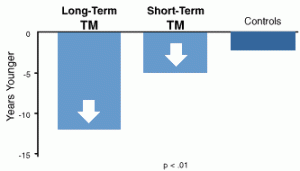 Biological age measures how old a person is physiologically. As a group, long-term meditators who had been practicing Transcendental Meditation for more than 5 years were physiologically 12 years younger than their chronological age, as measured by reduction of blood pressure, and better near-point vision and auditory discrimination.
Biological age measures how old a person is physiologically. As a group, long-term meditators who had been practicing Transcendental Meditation for more than 5 years were physiologically 12 years younger than their chronological age, as measured by reduction of blood pressure, and better near-point vision and auditory discrimination.
Short-term meditators were physiologically 5 years younger than their chronological age. The study controlled for the effects of diet and exercise.
*Reference: The Effects of the Transcendental Meditation and TM-Sidhi programme on the Ageing process, International Journal of Neuroscience 16 (1): 5358, 1982.
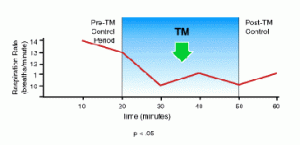 Subjects were measured for changes in breathing rate during the practice of the Transcendental Meditation technique.
Subjects were measured for changes in breathing rate during the practice of the Transcendental Meditation technique.
Breath rate fell from about 14 breaths per minute to about 11 breaths per minute, indicating the Transcendental Meditation technique produces a state of rest and relaxation. The change in breath rate is natural, effortless, and comfortable.
*Source: A wakeful hypometabolic physiologic state, American Journal of Physiology 22: 795799, 1971.
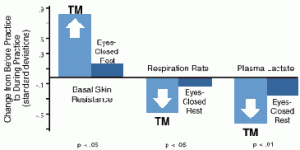 A meta-analysis, the preferred scientific procedure for drawing definitive conclusions from large bodies of research, found Transcendental Meditation produced a significant increase in basal skin resistance compared to eyes-closed rest, indicating profound relaxation.
A meta-analysis, the preferred scientific procedure for drawing definitive conclusions from large bodies of research, found Transcendental Meditation produced a significant increase in basal skin resistance compared to eyes-closed rest, indicating profound relaxation.
Deep rest and relaxation were also indicated by greater decreases in respiration rates and plasma lactate levels compared to ordinary rest. These physiological changes occur spontaneously as the mind effortlessly settles to the state of restful alertness, pure consciousness.
*Source: Physiological differences between Transcendental Meditation and rest, American Psychologist 42: 879881, 1987.
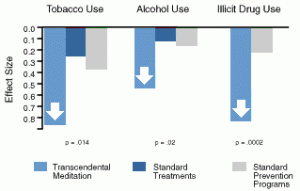 A statistical meta-analysis of 198 independent treatment outcomes found that Transcendental Meditation produced a significantly larger reduction in tobacco, alcohol, and illicit drug use than either standard substance abuse treatments (including counseling, pharmacological treatments, relaxation training, and Twelve-step programmes) or prevention programmes (such as programmes to counteract peer-pressure and promote personal development).
A statistical meta-analysis of 198 independent treatment outcomes found that Transcendental Meditation produced a significantly larger reduction in tobacco, alcohol, and illicit drug use than either standard substance abuse treatments (including counseling, pharmacological treatments, relaxation training, and Twelve-step programmes) or prevention programmes (such as programmes to counteract peer-pressure and promote personal development).
This meta-analysis controlled for strength of study design and included both heavy and casual users.
Whereas the effects of conventional programmes typically decrease sharply by 3 months, effects of Transcendental Meditation on total abstinence from tobacco, alcohol, and illicit drug ranged from 51%89% over an 1822 month period.
*Reference I: Treating and preventing alcohol, nicotine, and drug abuse through Transcendental Meditation: A review and statistical meta-analysis, Alcoholism Treatment Quarterly 11: 13-87, 1994. Reference II: Effectiveness of the Transcendental Meditation programme in preventing and treating substance misuse: A review, International Journal of the Addictions 26: 293-325, 1991.

